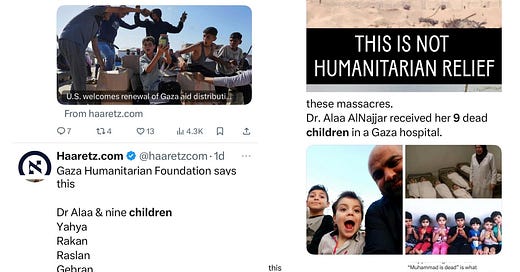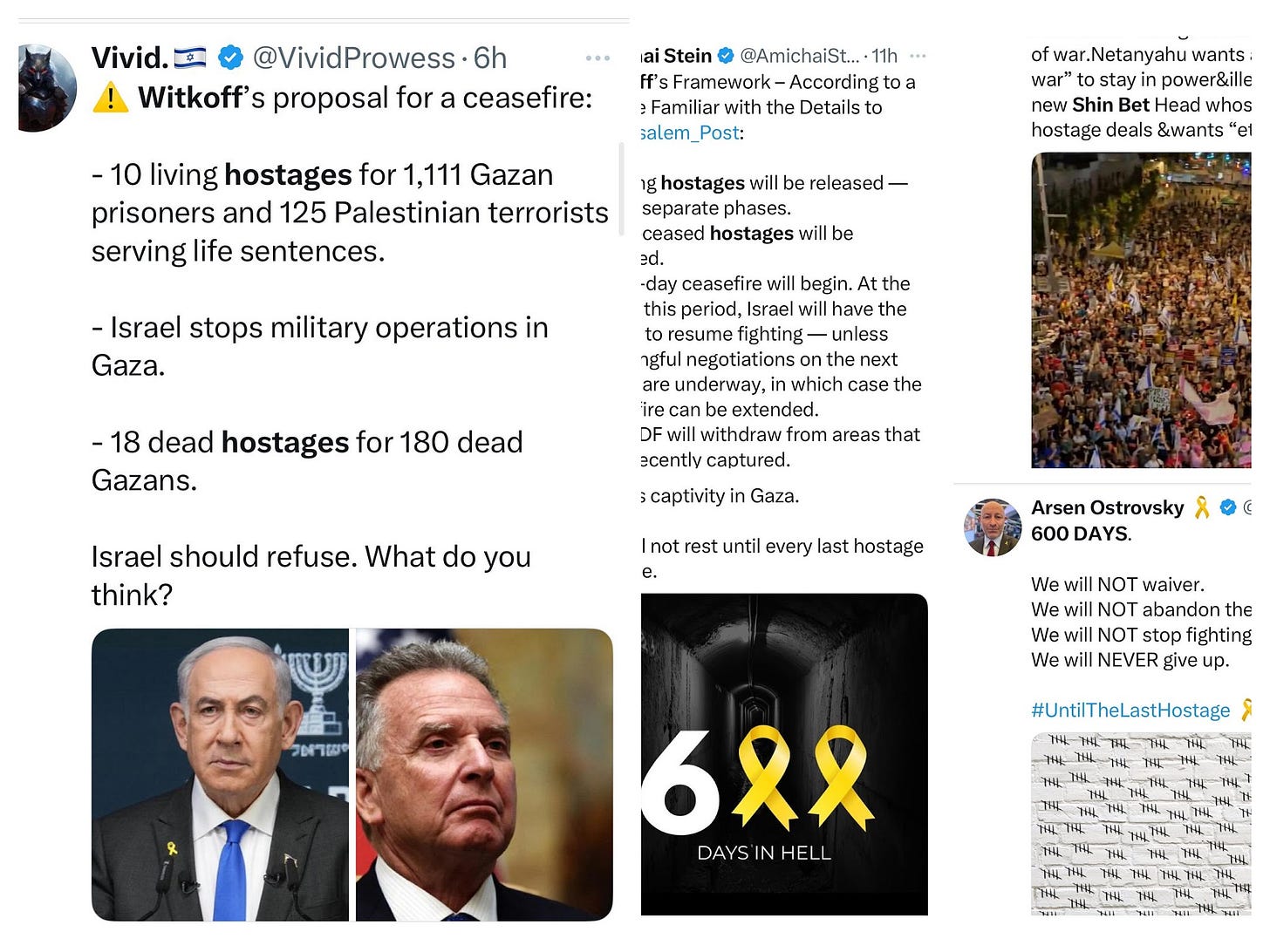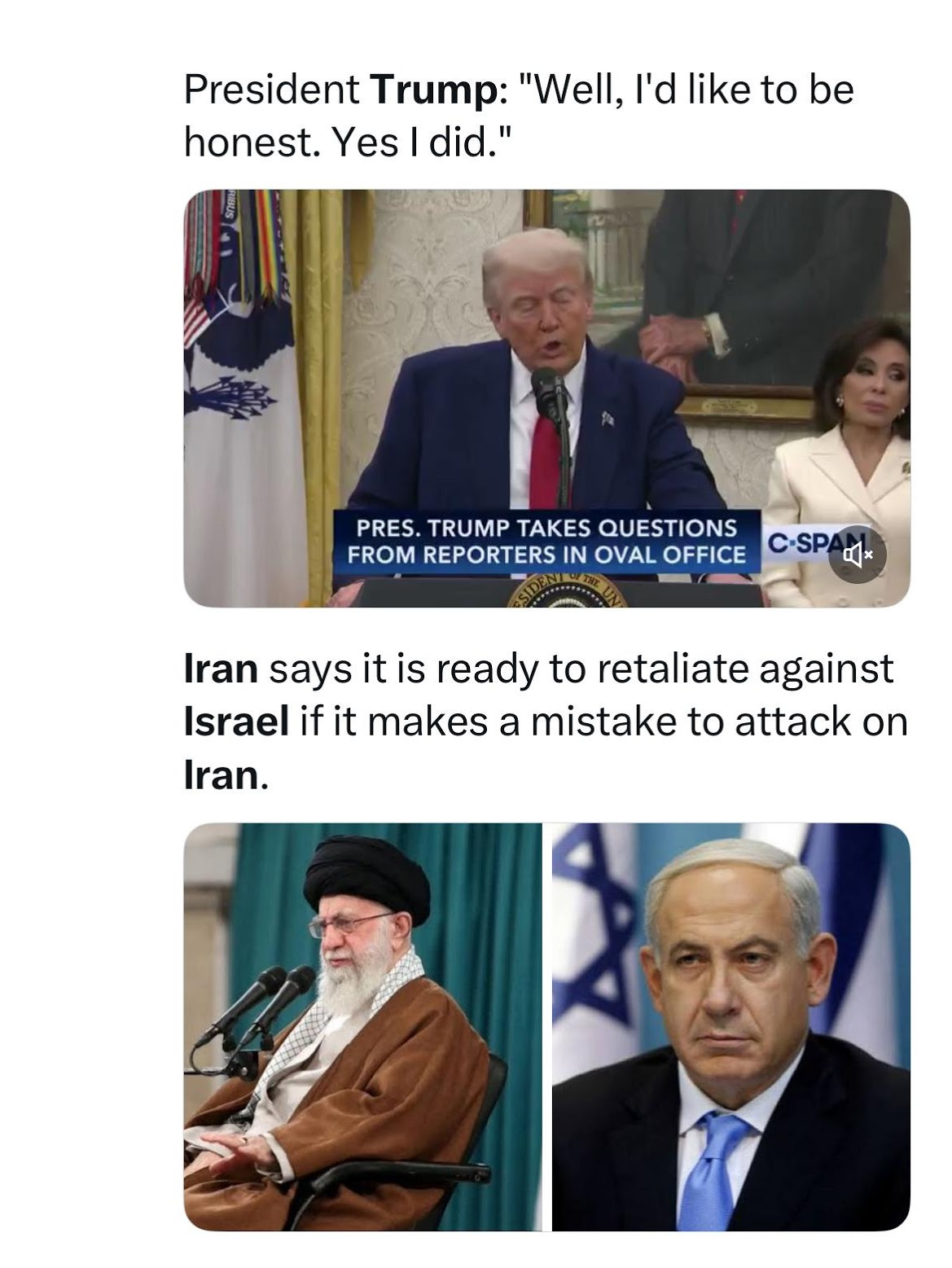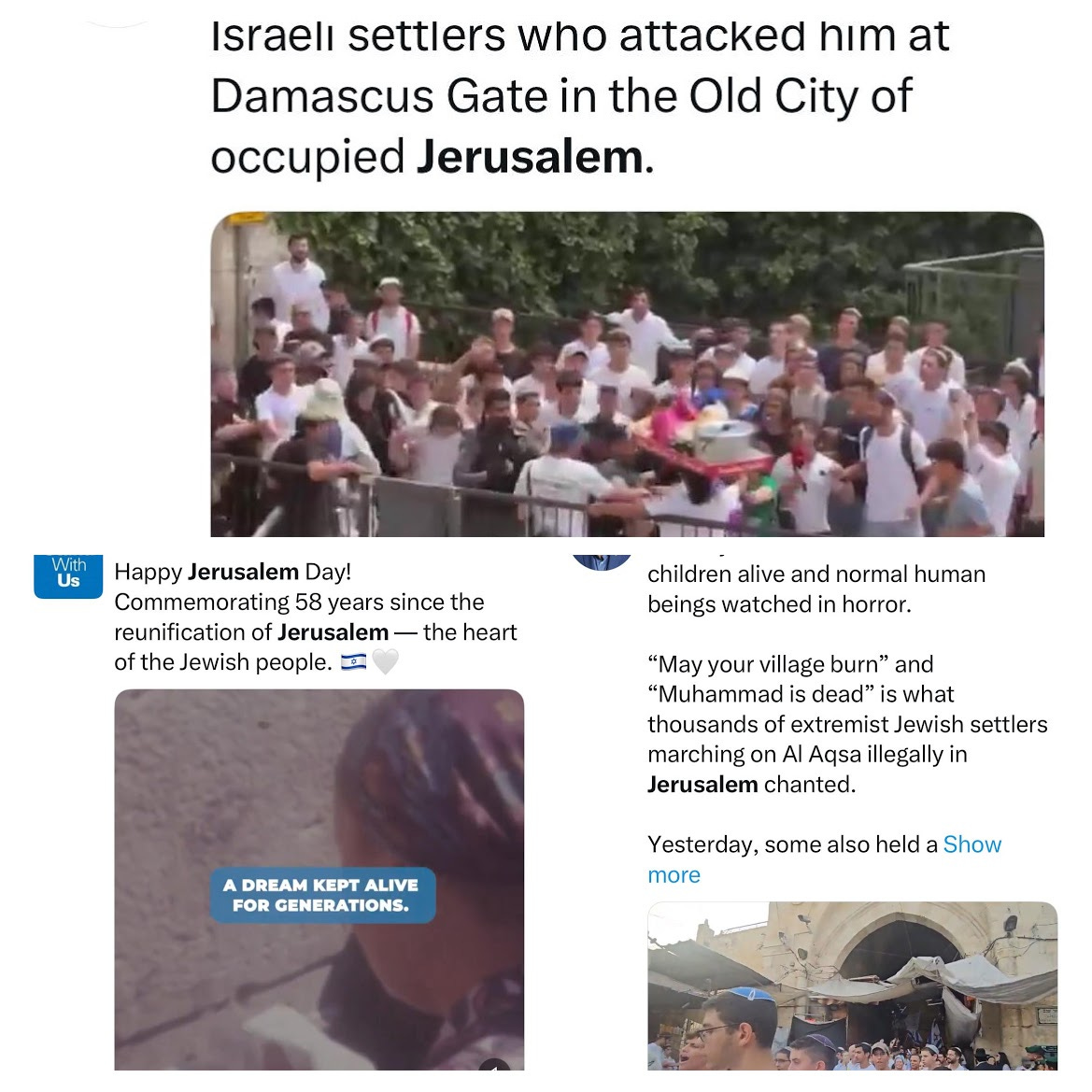Israel at War - Day 601
1. Israel Intensifies Military Pressure in Gaza, The Humanitarian Crises Worsens
601 days into the war, and more than a month since the last ceasefire, the Israeli army intensifies its offensive in Gaza, occupying huge areas all over the Gaza Strip, pushing almost two million Palestinians into small and crowded humanitarian areas somewhere in central Gaza.
Earlier this week, Israelis were shocked to learn that 9 out of ten children of the Palestinian family Al Najar in Gaza died in an Israeli air strike. This was a rare opportunity for the Hebrew media in Israel to cover and report on the humanitarian crisis in Gaza and mainly report the high death toll among civilians, mainly among children.
The humanitarian crisis in Gaza is growing rapidly. Israel, and especially PM Netanyahu were forced to open the crossings and checkpoints and allow humanitarian aid into Gaza, especially food and medical supplies. The Israeli policy since the renewal of the war on March 18th was that part of the pressure on Hamas should be created by preventing humanitarian aid into the Gaza Strip. This strategy was due to Hamas previously taking control of the supplies, and selling them to hungry Palestinians at inflated prices. Israel does not want Israeli soldiers or Israeli companies to be responsible for distributing the aid directly to the Gazans. Lately, it was exposed that some fake front companies were established to take responsibility for the distribution. It is still unclear with what financing and who is behind these companies while the situation in the Gaza Strip is dire. Famine is spreading, and heartbreaking photos of hungry children, holding empty pots are distributed worldwide. These images intensify the pressure on Israel to do more, but Israel does not want to be in any proximity to the civilian Palestinian population, and further, Israel insists that it does not want Hamas to steal the aid to sell to the Gazans. International human rights organizations indicate that the situation is deteriorating rapidly and that children will die of hunger.
2. 600 Days of Captivity:
Tens of protest sites and demonstrations were held all over the country to mark the 600th day since October 7th, 2023: the day Hamas carried out its massacre and abducted 251 Israeli citizens and a few foreigners from their homes to Gaza. 58 Israelis are still held hostage by Hamas, and 20 of them are still alive. All of the living are men. Families of the hostages, supported by thousands of people blocked main roads and escalated the protest. Many marched to the headquarters of the Likud party (the party of PM Netanyahu) in Tel Aviv, blocked the street, and some managed to get into the building. Around sixty of the protestors were detained or arrested by police for further investigation. All major media outlets dedicated hours of broadcast coverage for the 600th day of the war. All called for the immediate release of the hostages. According to public opinion polls, 53 percent of the Israelis support the ending of the war as part of the deal to release all the hostages.
PM Netanyahu does not prioritize the release of the hostages at the top of his political and diplomatic agenda. On the other hand, President Trump's special envoy to the Middle East, Steve Witkoff indicated that there may be a breakthrough in the coming days.
Earlier this week, PM Netanyahu said that he may have some good news soon. Many, especially among the families of the hostages hoped it was something to do with their loved ones, but later PM Netanyahu tried to correct what he said earlier and denied that there was any good news. Many understand that Israel can only rely on the Americans, especially President Trump and Witkoff to push for a deal that will eventually release all the hostages.
3. President Trump Stopped Israel From Attacking Iran
In a phone call with PM Netanyahu, President Trump prevented Israel from attacking Iran. The Trump administration is leading discussions with Iran to close a deal that will enable the Americans to monitor Iranian nuclear plans. Trump is eager to close a deal. On the other hand, PM Netanyahu does not trust that an agreement with Iran will be supportive of Israeli interests. Earlier this week a few journalists reported that Israel was close to launching an attack on Iran and that President Trump halted Netanyahu from so doing. PM Netanyahu denied such a conversation with Trump, but on Wednesday, President Trump publicly admitted it.
Analysts say that Israel can launch an airstrike on Iran in only seven hours. It is still unclear how the Americans learned about the preparation for the attack and if they obtained some intelligence about it.
It is important to say in this context that the international community already had a deal with Iran, the 2015 JCPOA that enabled the monitoring of Iranian nuclear plans, and ensured that they could not cross the line to enrich uranium to the level of obtaining a nuclear bomb. It was PM Netanyahu that convinced President Trump during his first term, to unilaterally withdraw from the agreement with Iran. That move enabled Iran to continue enriching uranium to a higher level and brought them closer to a nuclear bomb. Now President Trump wants to close a new deal that seems to be similar to the 2015 JCPOA.
4. PM Netanyahu Exacerbates the Constitutional Crisis by Appointing a New Shin Bet Director
PM Netanyahu announced last weekend that he has appointed Major General David Zini, an IDF high-ranking officer, as the new Shin Bet chief. The appointment came just 24 hours after Israel’s High Court ruled that Netanyahu is legally barred from making senior law enforcement appointments due to an ongoing conflict of interest. Attorney General Gali Baharav-Miara reinforced her statement following the high court ruling stated that Netanyahu's appointment of Zini is “invalid and unlawful" since Netanyahu should have waited until clear legal guidelines for the appointment of a new Shin Bet director were in place.
In making this rapid appointment, Netanyahu bypassed chief of staff Eyal Zamir, and informed him of it only minutes before going public, although Zini is under his direct command. Following the announcement of Zini’s appointment, Zamir summoned him to a hearing and dismissed him from the military.
Unnamed senior military sources told the media that while Zini was highly respected for his military operational acumen, his views on the continuation of the war and efforts to release the hostages through a deal were controversial. In a recording, Zini was heard saying: “I am against hostage deals, this is eternal war.” The headquarters of Hostages’ Families told the media that the appointment of Zini, who prioritizes the continuation of the war over the release of the hostages, is a decision made in sin.
The appointment has also drawn sharp criticism from opposition leaders, legal experts, and former Shin Bet chiefs. Opposition leader Yair Lapid (Yesh Atid) labeled the move a "serious conflict of interest," citing Zini's alleged connections to the Qatargate case. Several former senior security officials - including former Shin Bet directors - have called on Zini to decline the appointment to preserve the rule of law and avoid undermining the legitimacy of the security service. “If the head of Shin Bet is seen as a political appointee chosen in defiance of the courts and the attorney general, it undermines the agency's independence,”, said one former senior.
The Shin Bet (Sherut ha-Bitachon Haclallit - General Security Service) also known in Israel by the Hebrew acronym Shabak, is Israel's internal security service. Its main responsibilities are Arab-related counter-terrorism activities in Israel, the West Bank, and the Gaza Strip, detection and prevention of foreign espionage activities and Jewish terror, protective security for prominent individuals and high-ranking government officials, and providing security for Israeli embassies and Israeli airlines.
5. Violence and Racist Chants Mar Jerusalem Day Flag March
On May 26, 2025, thousands of Israeli ultranationalists participated in the annual Jerusalem Day "Flag March," which traverses the Muslim Quarter of Jerusalem's Old City. In recent years, the Jerusalem Day parade which commemorates the reunification of Jerusalem following Israel’s 1967 capture of East Jerusalem, has increasingly become a manifestation of Israeli Jewish hatred towards Arabs and Jewish supremacy.
Participants chanted slogans such as "Death to Arabs" and "May your village burn," while carrying banners with messages like "67 - Jerusalem in our hands; 2025 - Gaza in our hands." Palestinian shopkeepers closed their businesses amid fears of harassment and violence. Israeli activists who were present to prevent the violence from escalating were also the target of verbal and physical violence by those marching and chanting through the streets of the Muslim quarter in the Old City.
The march, organized by far-right groups and drawing tens of thousands of people, including right-wing religious youth movements, has a history of inciting violence against Palestinians. This year's event saw physical assaults on Palestinians, left-wing Israelis, and journalists, with minimal intervention from security forces.
National Security Minister Itamar Ben-Gvir's visit to the Al-Aqsa Mosque compound during the march further escalated tensions. His presence at the sensitive holy site was condemned by the Palestinian Authority and Jordan, as well as by prominent Jewish rabbis who reiterated the halachic prohibition to visit the Temple Mount compound.
Opposition leader Yair Lapid (Yesh Atid) criticized the event, stating it had become a festival of "hatred and racism," and called it "a disgrace and an insult to Judaism."
The annual Flag March's displays of Jewish supremacy and the associated violence have drawn international concern, highlighting the ongoing volatility surrounding Jerusalem and the broader Israeli-Palestinian conflict.










